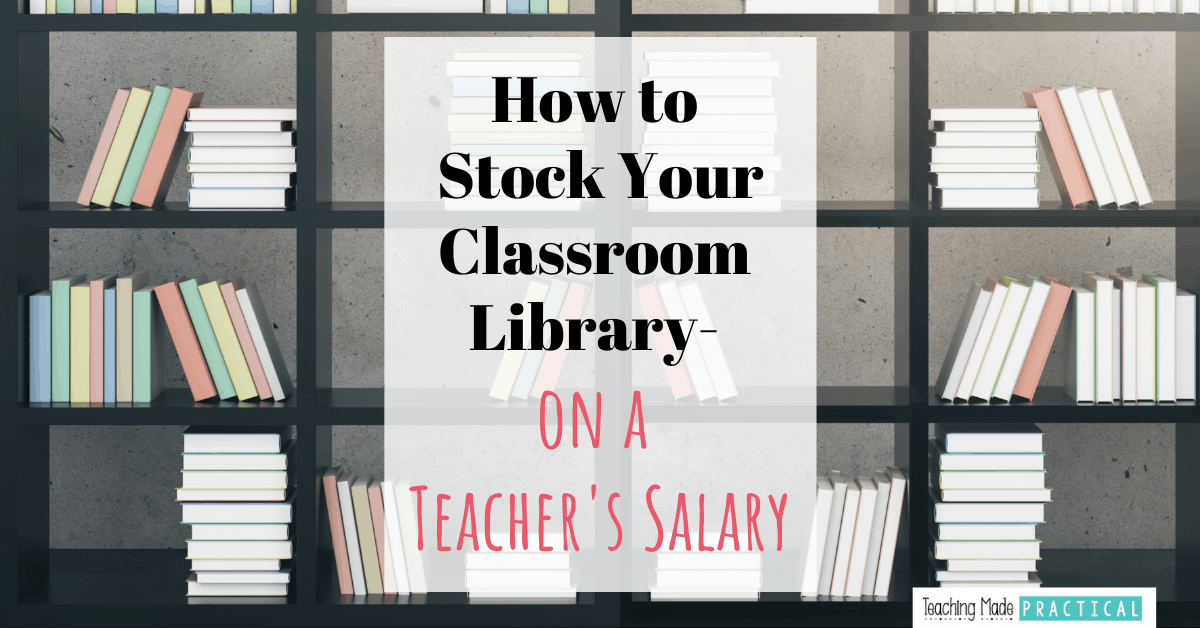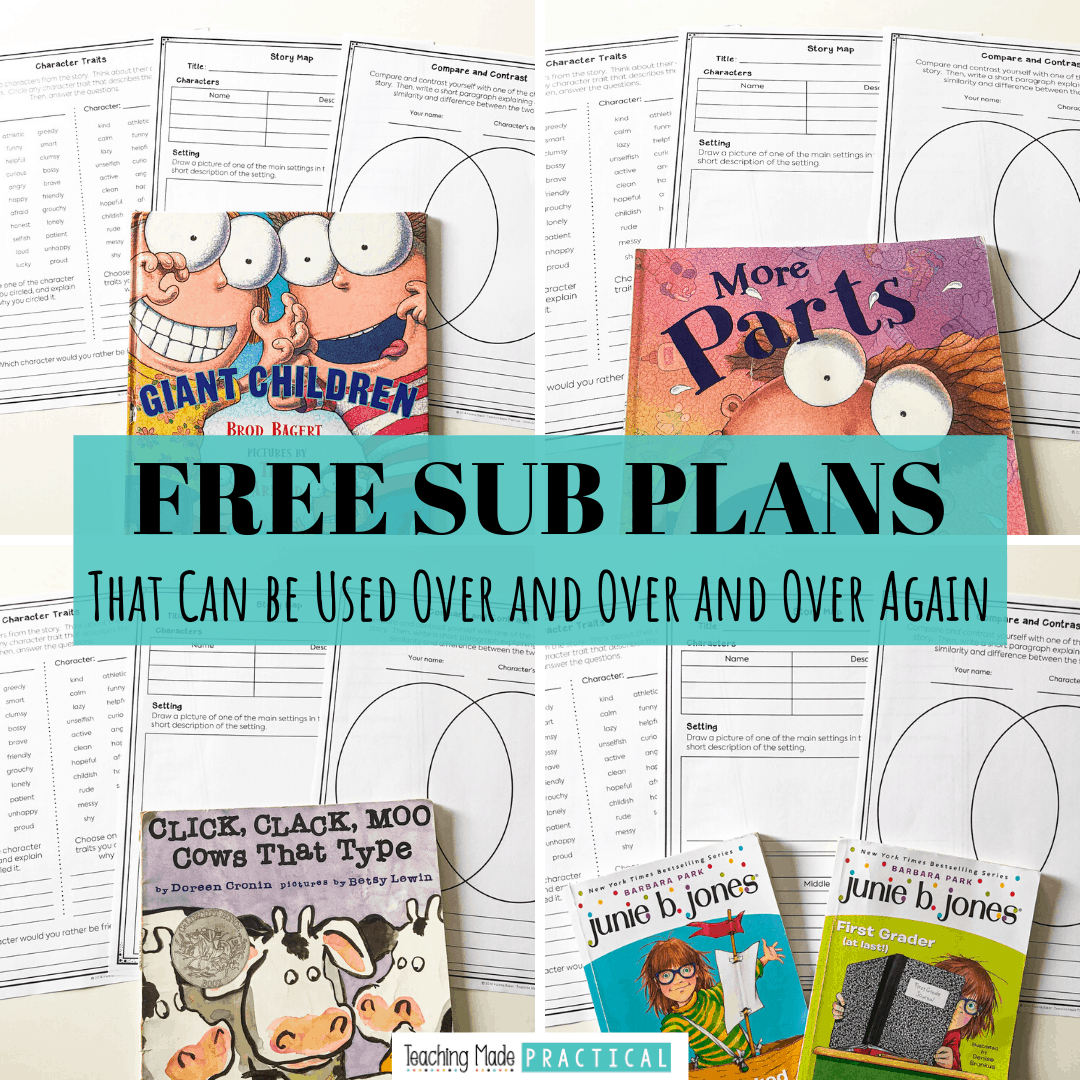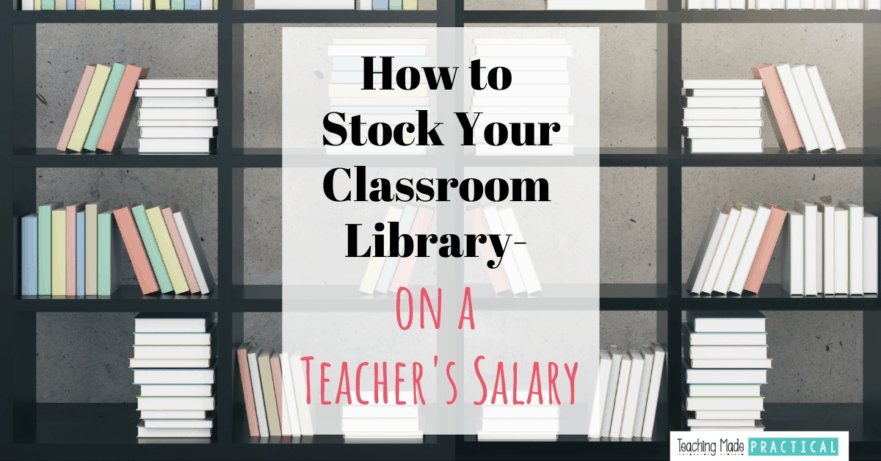
Written by guest blogger Cindy Koopmans
It can be a challenge to stock your classroom library with quality literature, especially if you are living on a teacher’s salary - with no additional side hustle or supportive spouse and no one is offering to give you money to buy books.
I’ve been in your shoes and here is how you solve that problem: you’re going to have to learn how to ask for support.
In my pre-teaching life I worked in the development department of a nonprofit, so I honestly do not suffer from a lack of boldness. However, even on those occasions when I felt a twinge of anxiety, I remembered that I wasn’t asking for myself. I was asking for someone who could not ask for themselves.
That’s right. You are asking because you love your students and you are striving to create readers. That doesn’t happen without access to top quality children's literature. From a former fundraiser, here’s how to begin:
5 Ways to Stock Your Classroom Library for Cheap
1. Ask for help from your circle of influence.
I promise you’ll feel a boost of support and be delighted by their response. Your friends, relatives, student’s parents (past and present, and everyone you know), gets that you are a dedicated educator. They have been looking for a way to let you know how much they love and support you.
Tell the story of what you are trying to create in your classroom: a culture of readers. Explain your current situation regarding books. Create a wishlist on Amazon and give them the link. Create a QR code that takes them directly to the list so they don’t have to fumble around. Make it simple, simple, simple for them to support you and your class.
2. Create a funding proposal through Donors Choose.
For two years in a row, I created proposals to fund books for my classroom library on Donors Choose. I’m going to share a link to one of my two projects, both of which were fully funded. Please feel free to shamelessly plagiarize my words, because I want you to get funded too.
You can access it here: Reading Like a Boss. Donors Choose will walk you through writing a proposal, so you don’t have to use mine as anything more than an example if you don’t choose to. Make it personal. Write with your heart.
When your proposal is funded, and you bet it will be, you will receive the shipment of books at your school.
Make a big deal of opening a box every day until they are all unpacked. Let the boxes sit on the floor at the front of the room and build their anticipation. It’s like opening a treasure chest. Do it up right and your students will be talking about it for weeks.
Take lots of pictures of the children’s faces. Donors Choose will expect evidence posted to your proposal and your donors will also want to see the results. If you ever plan on writing another proposal, it is important that people who funded you see the impact their donations had on the children’s reading lives.
3. Ask your school librarian to put your choices into her book budget.
Your school librarian can be your greatest ally, and perhaps already is. If your school librarian is open to ordering from a variety of publishers, and has the money to do so, then wow. Ask.
Give him or her access to your Amazon wishlist. Just make the assumption that they are overwhelmed and overworked too and give them a list of the books you’ve researched and know are award winning.
4. Ask a local bookshop to support your efforts.
A small town book store may either underwrite a portion of the cost of your class library or give you a discount on the books you buy. Lots of book and mortar bookstores give teacher discounts. Shop local.
5. Ask your principal for help, but be prepared with a proposal.
I’m not suggesting that you write a business plan, but honestly, the better prepared you are with a rationale, the better the chance that your administrator will say yes. What I’m saying is, think it through, set an appointment (don’t just drop in) and the likelihood of your getting a “yes” is higher.
A classroom library is not built in a year. You’ll know that you’ve been successful when you start looking for book shelves at garage sales because yours are full.
Take the classroom outdoors with these fun outdoor scavenger hunts that cover a variety of skills. The 8 scavenger hunts include:
- 5 senses scavenger hunt
- nouns and adjectives hunt
- math review
- living and nonliving
- syllable sort
- ...and more!
Get 8 scavenger hunts for $2.00 and enjoy some sunshine with your students!
Choosing Quality Books and Authors
Stocking your classroom library with thousands of books will be a waste of time unless you are choosing engaging, high quality books.
One way to track down books by great authors is to subscribe to a service like goodreads. You probably had some favorite authors as a kid, so start with them...Betsy Byars, Andrew Clements, Gary Paulson, Kate DiCamillo, Barbara O’Connor, Katherine Patterson, to name just a few.
If you are on a Facebook group for teachers then ask the group which authors they love and watch what happens.
Use clues from your 3rd, 4th, and 5th grade students - research the top selling books in genres they love. You have a wonderful opportunity to fill those empty shelves with the kinds of books your kids are dying to read.
You can also check out Teaching Made Practical's must have books to help stock your classroom library.
Making Sure Your Stocked Classroom Library Will Last a Long Time
This is important: create a check-out system. I use old-fashioned pockets and cards from Amazon. It works for me.
If you want to go a more high tech route, you might like this system for organizing and checking out books. And having a well organized classroom library helps, too.
Without a system in place, you will lose countless books to careless students. If a student damages a book beyond repair, arrange for them to tidy shelves or vacuum the classroom to repay you for the book.
You know this: what you value, they will value.
It is important for children to learn that nothing is free and that they need to take responsibility for the precious books that are loaned to them. I tell my students to treat our books like newborn babies. The book must be in the plastic bag when they are not reading it. You wouldn’t believe what finds its way into the bottom of a kid's book bag. You’re a teacher. You probably already know.

Never Stress Over Sub Plans Again!

Make copies, find a fiction book, and you'll be ready for any emergency that comes your way!




